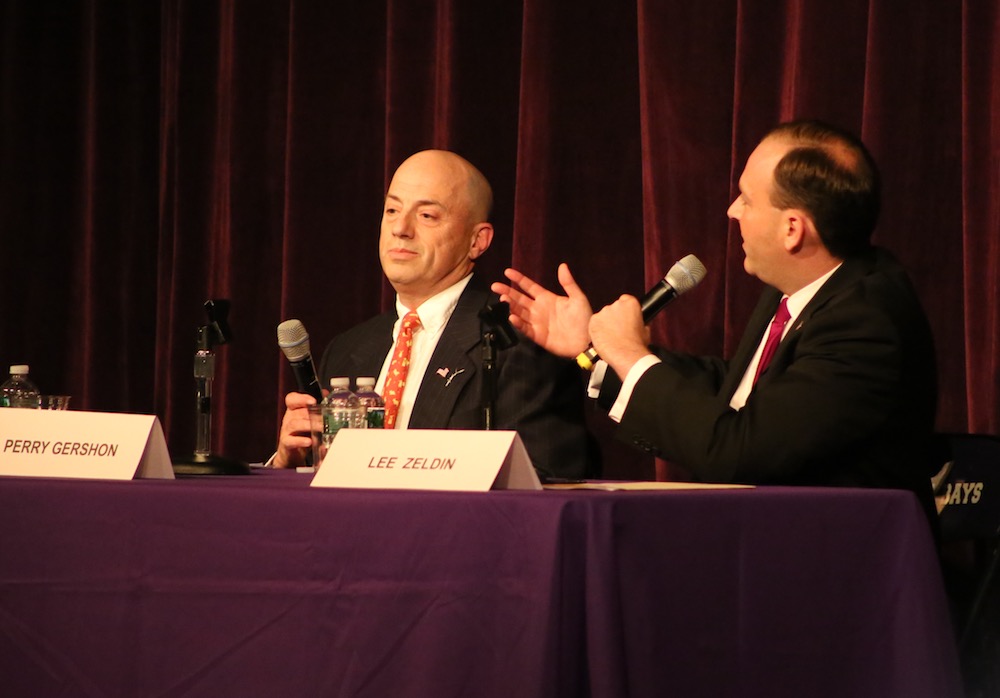At their debate, Zeldin and Gershon talk about guns and anti-Semitism

A man walked into a synagogue in Pittsburgh’s Squirrel Hill neighborhood, armed with an AR-15 and shouting anti-Semitic slurs.
Moments later, 11 people were dead and six more wounded.
According to the Gun Violence Archive, a nonprofit organization that tracks shootings nationwide, there have been 298 mass shootings so far this year. Midterm elections are often a referendum on whoever occupies the Oval Office. Will this year’s, a year which also saw the massacre of 17 high school students in Parkland, Fla., be a referendum on gun violence in America?
A debate held at Hampton Bays High School Monday drew over 400 constituents from the First Congressional District to hear the candidates speak out on the usual issues: health care, the environment, immigration reform. It began with a moment of silence for the victims in Pittsburgh and Louisville, where two African-American shoppers were killed at a grocery store last Thursday in what is believed to be a hate crime.
This time, the gun debate question drew a more emotional response from incumbent Lee Zeldin (R-Shirley) and his Democratic challenger Perry Gershon. Both men are Jewish.
One question came from Joe Shaw, a panelist and executive editor of The Southampton Press, who is also a Pittsburgh native. “After [the shooting,] Pittsburgh Mayor Bill Peduto was quoted as saying ‘We should take the guns, which are the common denominator of every mass shooting in America, out of the hands of those looking to express hatred through murder.’ How would you respond to the mayor of Pittsburgh?”
Mr. Zeldin said anyone — criminals, terrorists, the mentally ill — with plans to break the law using a firearm should not be able to get one.
But he said there’s a bigger issue at play in Pittsburgh. “We should be tackling the hate that caused it. That firearm did not discharge itself,” he said. “This should not happen anywhere in the world, so when you see it happen at home, it churns your stomach.”
Religious freedom should be protected, he added. “It is a right. No matter what your religion is, you should feel free and safe to be able to protect and practice your religion safely.”
Mr. Gershon condemned the rise of anti-Semitism in the U.S. and politically-motivated violence more broadly, expressing disgust over the pipe bombs that were mailed to former elected officials and CNN last week.
He said the eruption of violence is an “out product” of the country’s current rhetoric espoused by President Donald Trump.
“The leader in chief of this country is the major proponent of this poison rhetoric. He doesn’t stop. He wants to blame the media, he wants to blame the press as the enemy of the state. But he doesn’t take responsibility himself for his own words. And if he doesn’t do that, we’ll never heal,” Mr. Gershon said.
Last year, white supremacists held a rally in Charlottesville, Va., to protest the removal of a statue of Confederate general Robert E. Lee. Carrying Tiki torches near the University of Virginia campus, protesters chanted slogans like “Jews will not replace us.”
“That’s really where it started,” Mr. Gershon said of the flagrant anti-Semitism. “That gives license to lunatics that may have deep-seated anti-Semitic rage but keep it quiet to come out and show it.”
Mr. Zeldin said blaming the president for the shooting in Pittsburgh is “pretty outrageous,” adding that Mr. Trump’s daughter Ivanka has converted to Orthodox Judaism and that he supported moving the U.S. Embassy to Jerusalem. “He is getting criticized for being too close to Jews,” Mr. Zeldin said.
Mr. Gershon said while Mr. Trump isn’t directly responsible, he’s encouraged violence and created an atmosphere where violence is tolerated. “I’m not saying the president is an anti-Semite. He’s not. I’ve met him. But he’s enabling anti-Semitism by not taking responsibility for his own words and not condemning hate and violence the way he should be,” he said.
Mr. Zeldin called for the nation to come together. “Our country is not going to do a good job uniting between now and Nov. 6,” he said. “But what’s very important is all coming together on Nov. 7,” regardless of who is elected.
Photo caption: Lee Zeldin and Perry Gershon faced off during a debate Monday. (Tara Smith photo)









